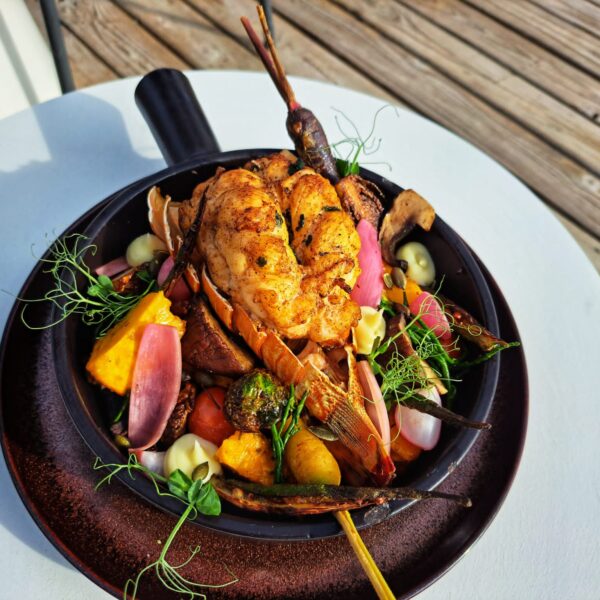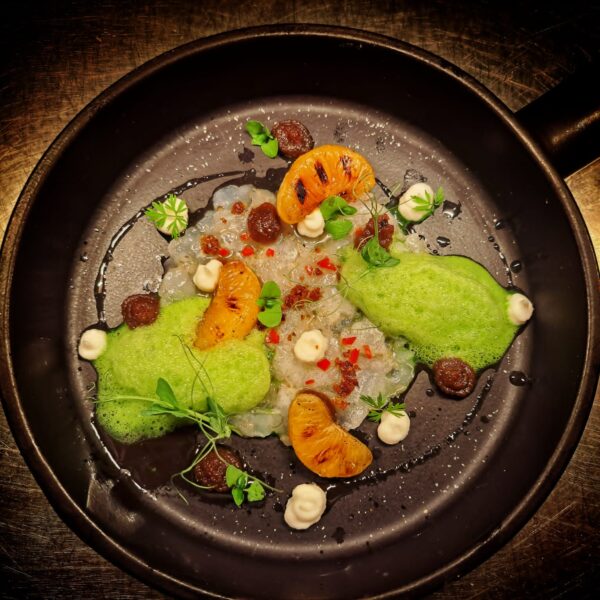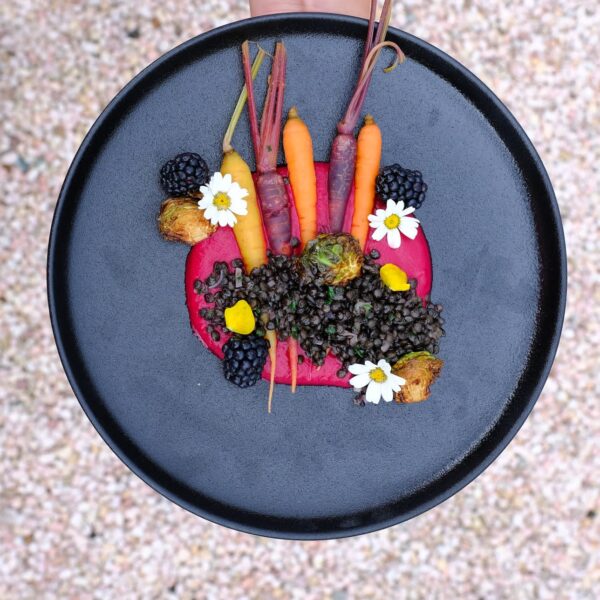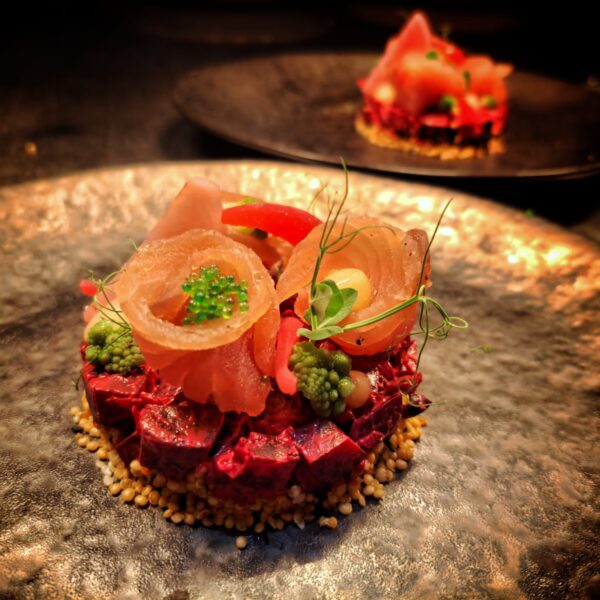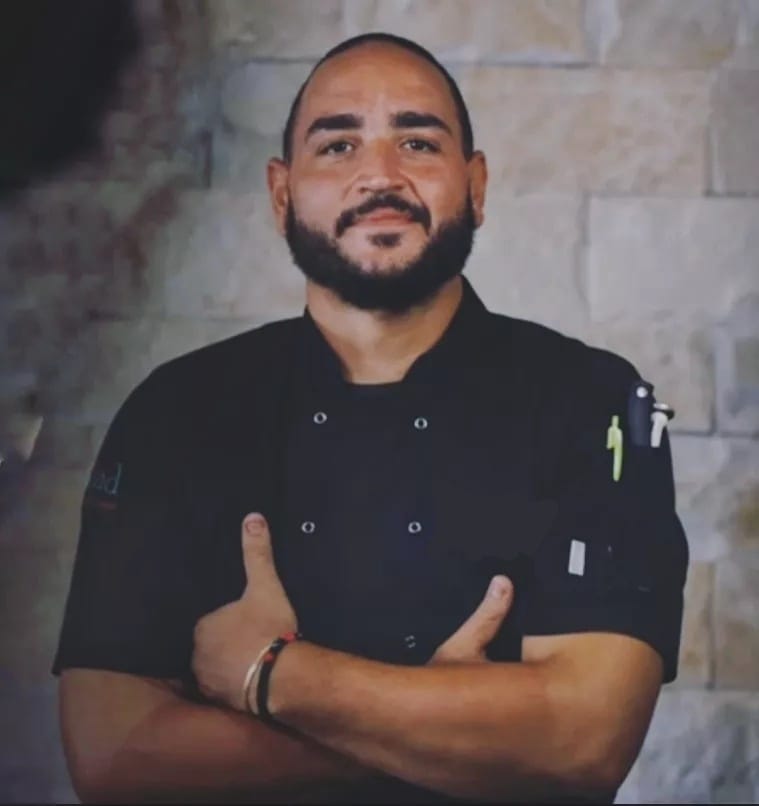
A Chat with Chef Jonathan de Haseth
There’s a new vibe at Restaurant 020, and we know why. It might have something to do with their new chef, Jonathan de Haseth. The Montaña resident has assumed the role of Executive Chef at the popular seafront restaurant.
Set against a picturesque backdrop of the Caribbean Sea, Restaurant 020 has established a reputation for serving wonderfully crafted international cuisine. Undoubtedly, with Jonathan at the helm, they will maintain their place as one of the best restaurants in Curaçao. Jonathan brings not only a love of food but an ancestry in the art of cooking that informs his work. As a result, his skills can only be described as seasoned.
Excited about his relatively new role and amazingly diverse staff, Jonathan stepped out of the kitchen long enough to chat with us. Read on as we learn about his speciality, cooking style, kitchen pet peeves and more. He also offers some tips for the home cook.
What made you interested in cooking initially?
I’ve been around the kitchen from a very young age. My grandmother moved from New York to Curaçao and later remarried. My step-granddad had a catering restaurant, so I’d say it began there. Also, my mum has always worked in the hotel industry, so both contributed to my initial interest.
Briefly share your progression from your early interest in cooking to becoming a restaurant chef.
After finishing culinary studies at Maris Stella, I had a great opportunity to work at the Hyatt. I began as a cook and then became a supervisor. After that, I got to be one of the young sous chefs. While there, I met an American and a German chef, and they taught me a lot, particularly Chef Timothy Paroulek. He moulded me into who I am today.
Restaurant 020 features many delicious dishes. What’s your process for adding a new one to the menu?
Actually, we recently launched a new menu. It’s a little more rustic mixed with fine dining. The process of adding new dishes is not difficult. We look at what’s popular and then make changes, adding new ones. When selecting a specific one, either I make a dish or I make it with my team. We settle on the recipe and decide what we’d like to do with it, whether lunch or dinner. Next, if the owners like it, we put it on the menu.
Which cuisine and dish do you consider your speciality and why?
I’m experimenting so much right now that I see what works every time I try new stuff. I’m fortunate because, at Restaurant 020, I can try new things, and I love that.
That said, I do a fusion of Caribbean International cuisine a lot. I’m also doing Asian-infused. Mostly, I cook fish. I do my own fishing and lobster catching.
For a personal meal, what is your favourite way of preparing fish?
Well, it depends on which fish. I’ll add salt, pepper, and sesame seeds in a nice soy ginger sauce and probably a noodle salad on the side if it’s tuna. If I’m doing local, I’ll go with the traditional polenta. A soft polenta in creole sauce, a nice white fish like Wahoo or Mahi Mahi fried, and a little lime.
What is one aspect of a chef’s role that most people don’t know about?
Most people don’t know about the behind-the-scenes stuff, like the menu costing, schedule making, and price checking with vendors. There’s a lot of paperwork! At times, I don’t get to cook as much as I want, as there’s other administrative stuff.
Also, you’re almost like a psychologist to your staff. The tourism industry involves high pressure and long hours, so as a chef, it involves keeping everyone calm.
What is one of your pet peeves in the kitchen?
First, I don’t like when people don’t take responsibility; mistakes happen, and I prefer if you just own up to them. Also, I like to keep things as clean as possible, organised and prepped. But at Restaurant 020, I don’t have those issues; the staff is amazing! That’s about it; I’m not like the old-school chef with no talking and such.
What advice would you give to anyone aspiring to be a chef?
I often go to schools to give motivational talks, and when students say they want to do it for the money, I tell them, “Stop. You’ve got to do it because you love it; because you’re passionate about it. Don’t do it for the money because you won’t get far in this business.” Although the island runs on tourism, it’s one of the lowest-paid sectors.
However, some changes are occurring in the profession because chefs and cooks have become scarce. Each year there are fewer, and it’s not just here on the island; it’s global. So, we do need them.
What is one dish you have not yet attempted but look forward to preparing one day?
I’ve always wanted to use Wacky fish or Blue Fin tuna. We don’t have them here, so they’re expensive to purchase. But I would like to try them and see how people react.
What do you love to eat?
Let’s see; I like a lot of stuff. However, if I must choose, it’s going to be meat, for sure. I love fish, as I said earlier. Also, I catch lobster, but a nice steak is always good. We’re talking about a nice T-bone, but I love my fish. If I had to choose a fish, I’d go with Waho and tuna.
Which kitchen appliance do you consider to be an absolute necessity?
It’s had to choose one. Also, technology has changed in the kitchen. For example, at Restaurant 020 we don’t use gas, it’s all electricity which helps to keep the kitchen cool. So, I’d say oven, mixers and thermo blenders.
If pressed to describe your cooking style, how would you?
My style is rustic-fine dining. I do beautiful but with a bit of roughness, which is like my personality. Also, I learnt that skill from Chef Tim. However, when I went to Holland, I learnt more of the finer French style, which is beautiful. I incorporate that into my rustic approach, so my dishes reflect both.
Chefs often have a country they would love to visit because of the cuisine. What is yours, and why?
I’ve been to several countries since living in Holland gave me access to other European countries. So, it would have to be in Asia, maybe Japan, China or Korea. Yes, Korean cuisine.
Is there a local ingredient you love to work with and often incorporate into your dishes?
Okra. I use a lot of fried okra.
What’s one tip for the home cook?
Don’t be afraid to try new things, experiment. Sometimes you’ll make something and not like it. Other times you’ll think it’s terrific—so just keep trying.
What’s one cooking technique you learnt early on that you continue to use?
It might not be considered a technique, but it should be—patience. It must be a part of the cooking technique because if you don’t have patience, you cannot cook good food. Many people tend to rush stuff in the kitchen, which may turn out bad. We have a saying at Restaurant 020, “a soup too fast is a salty soup”. Basically, if you rush and don’t do it well, it won’t come out right.
Restaurants of Curaçao thanks Chef Jonathan de Haseth for a lively chat.
****
Haven’t been to Restaurant 020 yet, or has it been a while? Why not drop in for brunch, lunch or dinner and check out what Chef Jon and his team are serving up? Be the first to try out the new items they’ve added to their menu.
Restaurant 020 opens Monday to Saturday noon – midnight and Sundays 10am to midnight.
For more information on Restaurant 022, visit www.restaurant020.com
Email: info@restaurant020.com
Phone (Reservations): +5999 465 6066

